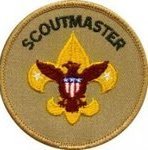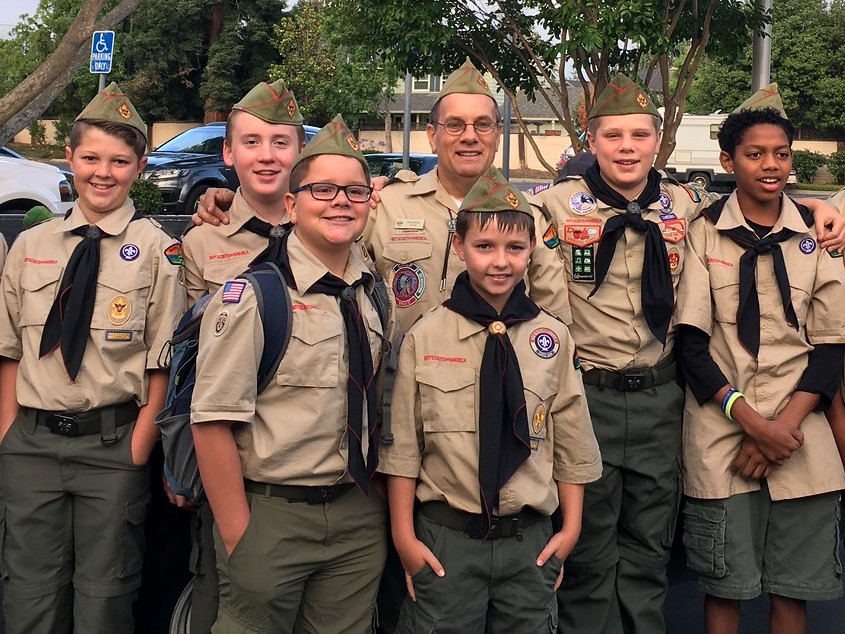-
Content Count
559 -
Joined
-
Last visited
-
Days Won
13
Content Type
Profiles
Forums
Articles
Store
Posts posted by gblotter
-
-
9 minutes ago, qwazse said:
But suppose after 6+ camping nights, one boy doesn't change his behavior, and gets the "go big or go home" speech, and the kid opts for home ... he will at least have amassed a few nights camping where some older boys took the time to march across a field and hold open the door for him to the promise of scouting. He and Dad leave with a few skills that they can build on with their family. And, his memories of camp might draw him back in a year or two.
I keep wondering to myself how such situations of daddy dependency will be viewed in this new era of "Family Scouting" (there seem to be varying opinions on what exactly that term means).
-
1 hour ago, NJCubScouter said:
For most of my youth as a Boy Scout, my shirt had no collar, and when I became an adult leader (with a collared shirt) I always opted for a bolo tie, since I absolutely hate wearing a neckerchief.
Me too.
I wear a bolo tie - partly to set myself apart as Scoutmaster but mostly because I hate neckerchiefs.
I would be fine if our troop abandoned the neckerchief altogether, but the boys really seem to like it.
-
10 minutes ago, TAHAWK said:
BSA on the results of the "Improved Scouting Program" of 1972:
"While well-intended, the plan flopped,...."
"Hillcourt’s biggest impact came after he retired. In 1972, the BSA revised the Boy Scout program, de-emphasizing outdoor skills in a bid to become more relevant to America’s urban population. While well-intended, the plan flopped, and Hillcourt stepped in. He saw the need for a new Scout handbook, one that would capture the romance and excitement of Scouting, so he offered to write it for free. It was an offer the BSA couldn’t — and didn’t — refuse.
That handbook — the ninth edition —appeared in 1979 and went on to sell 4.4 million copies. In its opening pages, 78-year-old Hillcourt described the same sense of adventure he had first experienced so many decades ago: hiking and camping with friends, following the footsteps of the pioneers, staring into the glowing embers of a campfire and dreaming of the future."
Scouting, January, 2018. (available on line at https://scoutingmagazine.org/2017/12/scoutmaster-to-the-world/)
Yep - I read that article, too, and picked out the same sentences.
-
Just now, Hawkwin said:
The black necker is pretty fancy too! Is that their patrol patch on their hat?
The black neckerchief is standard issue from the BSA Scout shop. The hat emblem is the regular BSA fleur-de-lys used in the 50-60s.
2 minutes ago, Hawkwin said:What is the rule or guideline on shiny or subdued necker slide?
I'm sure others here on Scouter.com are better experts than I about uniform etiquette. But I believe neckerchief slides are highly customizable and can be almost anything you like - even carve your own.
4 minutes ago, Hawkwin said:Does above or below the collar matter?
That sounds like a Democrat vs Republican debate to me - not going there - haha. My son and I regularly argue over that point, actually. I'm sure others here will have something more definitive to say. And I have no doubt it has already been hotly debated in a previous thread - lol.
-
 1
1
-
-
-
1 hour ago, DuctTape said:
In the end it is up to the local unit to provide a robust program.
Local units are the face of Scouting and the boots on the ground to make any program work. But local units can do only so much to rescue National from their own bumbling mistakes (then and now).
The Improved Scouting Program drove away membership by the millions. It was a train wreck of a program, and the incompetent CSE deservedly lost his job because of it. Good riddance to Skill Awards and red berets.
-
1 hour ago, DuctTape said:
Also the skill award concept was a positive step.
I speak for no one but myself here.
I absolutely hated the entire Skill Award concept. That was my primary motivation for rushing to Eagle under the old requirements - so I wouldn’t be stuck earning those despised Skill Awards. I actually was given a couple of Skill Awards somewhere along the way just because they were supposed to be part of immediate recognition. I threw them away because they meant nothing to me. They are not even part of my collection of Scouting memorabilia.
-
8 hours ago, krikkitbot said:
I guess my question would be, if he shows up 3 years after disappearing and asking for project approval, SM conference and EBOR, do you approve it?
I am not focused so much on the passage of time or his lapse in activity. Rather, I am focused on his minimum level effort. I could support his effort more if he had more effort to support.
-
1 hour ago, CalicoPenn said:
Many of us who went through the 1970's program tend to remember things differently.
If you had a good experience with the "Improved Scouting Program", well then good for you.
I'm one of those people who lived it, too. I was part of the mad dash to finish off my Eagle in early 1974 under the old requirements. The new Scouting program was confusing and unappealing. I dropped out shortly after all that was introduced (along with more than 2 million other Scouts who voted with their feet). The Chief Scout Executive, Alden Barber, was not forced into early retirement because the program was a great success.
-
Creating new requirements has never been part of my thought process - obviously, that is out of line.
And, yes - meeting the minimum requirements necessitates a "pass". These points are self-evident.
I'm actually not seeking a way to "fail" this Scout - that is not why I started this thread.
I'd much rather inspire him to go beyond minimal efforts so that the result has more than minimal significance. Perhaps I'll phrase it to him using those words.
-
 1
1
-
-
On 2/28/2018 at 1:22 PM, Tampa Turtle said:
If girls represent 5% and our membership continues to decline we will become REI Scouts of America (or whatever brand(s) help bail us out).
* Cabela's Scouts of America
* Bass Pro Shop Scouts of America
-
29 minutes ago, MattR said:
you need to decide for yourself what you are going to do. All I can say is, whatever your decision, keep it consistent with everyone and let everyone know about it before hand.
Yes - consistency is on my mind. I remind myself that I can't/shouldn't set a special hurdle for him that I do not impose on everyone else in the troop.
I know this boy has had some past struggles in his personal life. His dad views Eagle as a way to lift the kid's self-esteem and instill a sense of accomplishment. However, if the boy is not doing quality work, his court of honor will be more of a shrug than a high-five.
-
 1
1
-
-
2 minutes ago, Tampa Turtle said:
'virtue signaling' I have never heard that term?
From Wikipedia: Virtue signalling is the conspicuous expression of moral values done primarily with the intent of enhancing standing within a social group.
Virtue signalling a popular term in politics these days. Basically, it is making yourself look superior to others by spouting off about how your opinion is the only moral way to think about an issue. The intent is to create an atmosphere where anyone who disagrees with you must necessarily be immoral.
-
9 minutes ago, blw2 said:
I didn't agree with 100% of Clarke's suggestions, but I found him to be very thoughtful and more often than not really made a lot of sense.
I try to always stay open to the wisdom of others whenever/wherever it surfaces. I listened to one of Clarke's other podcasts. He does a fair amount of virtue signaling about his viewpoints - I found that annoying at times. Likely my problem, not his.
-
1 hour ago, krikkitbot said:
I know that there is a desired distance of 100 yards between adult tents and youth tents.
With the size of campsites we usually occupy, 100 yards is not really practical. A hands-off attitude works pretty well for us.
-
Only rarely do our Scouts share a tent with dad. There is an annual father/son campout where it makes sense.
Sometimes one boy will end up without a tent partner (odd numbers). I have no problem if a Scout tents with his dad in that situation either, but we can usually get him into a tent with other boys so that isn't necessary.
-
10 minutes ago, Tampa Turtle said:
Be optimistic. Be friendly.
Yep - I’m trying, but it’s a struggle in this situation. He deserves a positive - not pessimistic - response from his Scoutmaster.
-
 1
1
-
-
The Scout (and his father) have requested a meeting to discuss his POR requirement. We could definitely use a Troop Guide for our New Scout Patrol. I’d be satisfied if he showed up to help at their weekly meetings once a month. And teach them specific skills (not just be a warm body in the room). We’ll see how he responds to that idea.
-
 1
1
-
 1
1
-
-
1 hour ago, fred johnson said:
This is a totally different discussion that can go on a long long time. ... I think people should be able to choose, but I don't think parents and scouts know what to look for when shopping. From what I've seen there is a dynamic between what is a good troop and what looks good. Also, there is an issue of cities with many troops and a few grow to be mega troops and the others starve and look like pale images. It's unhealthy for a troop to be really large and to be starving for members. IMHO, the current troop shopping model does NOT work. ... but a different thread.
Yes - an interesting topic, which I’m sure has been covered in other threads.
Our troop selection is predetermined by LDS affiliation (although we could certainly jump ship if desired). My focus has then been to help make my existing troop the best possible. I strive for inclusion, active camping program, good parent engagement, and positive attitude.
I’ll admit a preference for smaller troops (30-ish is ideal). Mega troops are not my thing. Struggling troops without critical mass are depressing. I’ve had a variety of experiences, and I’d much rather go camping with 10 boys than 40 boys.
I’m glad there’s enough variety in troops to satisfy different preferences.
-
I have a 16 year-old Life Scout who was active in younger years but is now absent from Scouting activities.
His father has convinced him that Eagle Scout will look good on a college application. The boy openly admits that as his motivation and says it without shame. If he can’t finish Eagle before college applications are due next fall, then he will abandon the effort.
He is doing the bare minimum to satisfy each requirement. For example, he will come on one campout a year to demonstrate his activity in the troop. I’m uncomfortable with his whole approach. I’m not going to erect artificial hurdles for him to jump, but I’d like to see some quality in something - anything - he does.
This just feels wrong to me. Looking to learn from anyone with a similar experience.
-
1 hour ago, ParkMan said:
The problem isn't that Scouting is hard. The problem is that we all seem to have different definitions of what it is.
Forget what we think. Scouting is having a hard time defining itself right now. The movement is adrift.
1 hour ago, ParkMan said:Benevolent drill seargant Boy Scouts is different from "long leashing" Boy Scouts. They are both ways to run a youth program - sure would be nice though if our troop leaders were a bit more consistent.
True - leaders and leadership styles will certainly vary, but so what? Does that really matter? It happens everywhere in life. Do we try to force every Scout to be the same? Should we try to force every Scouter to be the same? The Scouting movement is composed of unique individuals who are different by definition. If we are wise, we use those differences to our advantage. Some Scouters are incredible archers, riflemen, naturalists, or climbers. I know some troops that specialize in backpacking, while others are into fishing, and another builds their own canoes. If homemade canoes are not your thing, it is easy to find another troop with a different focus. Vive le difference! Scouting is not McDonalds.
1 hour ago, ParkMan said:There it really saddens me because new parents have no idea how little boy led there usually is in your typical troop.
And if that is a problem, find a different troop that better suits your needs and meets your expectations. The best troops will always thrive, and that's a good thing.
-
6 minutes ago, JustAScoutMom said:
I'm going to predict the older girl program will be "Girl Guides" as a homage to the international girls. If they just throw a label out there, people will calm down.
Paying homage to a historical label like Girl Guides will likely help traditionalist swallow the pill a bit easier, but our Texas brainiacs don’t have a great track record in this area.
-
14 minutes ago, Eagle1993 said:
What was the experiment? I was 2 in 79 so my memory is a bit fuzzy.
It was a disastrously failed attempt to reinvent Scouting for the modern era. This could never happen again, say by reinventing Scouting to include girls? Nah.
From Wikipedia.
Outdoors skills de-emphasized
In September 1972 the Boy Scouts launched the "Improved Scouting Program," publishing a radically revised handbook with less emphasis on outdoor skills for the three lower ranks. Skill Awards for Hiking, Camping, and Cooking included outdoor skills requirements and were required for Second Class and First Class Scouts. Several outdoor merit badges were removed from the list of those required to become an Eagle Scout; those removed from the list included Camping, Cooking, Nature, Swimming, and Lifesaving. The Scoutcraft information and requirements were replaced by information on drug abuse, family finances, child care and community problems. The use of boy was de-emphasized: the eighth edition of the handbook was titled simply Scout Handbook and the new strategic logo used Scouting/USA. The concept of the personal growth agreement conferences was introduced as a requirement for each rank.
Other changes included new colored cloth badges for all ranks and positions and "skill awards", represented by a metal loop worn on the belt, that were awarded instantly at the time they were earned. They supplemented individual rank requirements which along with merit badges were also presented immediately, and recognized later at the court of honor. The merit badge program—previously only available to First Class and above—was opened to all ranks, and merit badges were required for Tenderfoot, Second Class and First Class. The number of required merit badges for Eagle Scout was increased to 24, and Camping merit badge was dropped from the required list. The entry age was changed to 11 or 10-½ if a boy had finished fifth grade.
Return to traditional Scouting
1970s-era Scouting/USA branding
The changes in the advancement requirements were a disastrous failure for Scouting and membership plummeted. The BSA lured William "Green Bar Bill" Hillcourt out of retirement in 1979 and he spent an entire year writing the 9th Edition of the Boy Scout Handbook. It was a return to the traditional Scouting program after the disastrous membership losses suffered by the 1970s program. From a peak of 6.5 million Scouts in 1972, membership declined to a low of 4.3 million in 1980. The 9th Edition has a great deal in common with prior editions of the handbooks that Hillcourt had helped write. The new edition reproduced entire paragraphs and pictures from the earlier editions.In 1976 the National Boy Scouts discontinued the Improved Scouting Program and introduced "All Out for Scouting", a back-to-basics program developed by Hillcourt. The program was launched with "Brownsea Double-Two", a week-long course for the senior patrol leader who would then introduce the troop-level "Operation Flying Start" to their units. It emphasized teaching and practicing Scout skills, the purposes of Scouting, and the role of the patrol method within the troop program. Many councils ran both Brownsea and Troop Leader Development, but some councils held only one or the other. The number of Eagle required merit badges was reduced back to 21, and Camping was restored to the required list.
-
51 minutes ago, NJCubScouter said:
My Scout shirt from the early 70s has "Scout BSA" over the pocket, not "Boy Scouts of America" as it was before and after that (including now.)
Mine too. But I hope no one is nostalgic for that disastrous experiment of the 70s. Can we really not learn from past mistakes?





Buzzfeed - CSE Surbaugh - Girls - Scouter.com
in Issues & Politics
Posted
In theory, that option will not exist for Girl Patrols in Boy Scout Troops. It is an option for Girl Dens in Cub Scout Packs.